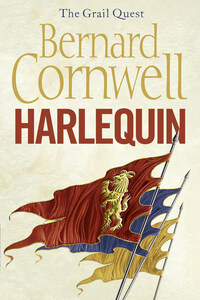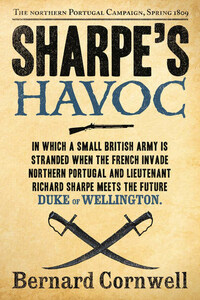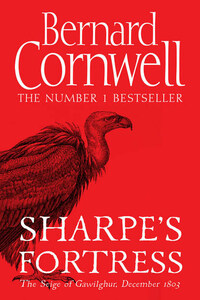BERNARD CORNWELL
Harlequin
Published by HarperCollinsPublishers Ltd 1 London Bridge Street London SE1 9GF
www.harpercollins.co.uk
First published in Great Britain by HarperCollinsPublishers 2000
Copyright © Bernard Cornwell 2000
Bernard Cornwell asserts the moral right to be identified as the author of this work
A catalogue record for this book is available from the British Library
This novel is entirely a work of fiction The names, characters and incidents portrayed in it are the work of the authorâs imagination. Any resemblance to actual persons, living or dead, events or localities is entirely coincidental.
All rights reserved under International and Pan-American Copyright Conventions. By payment of the required fees, you have been granted the non-exclusive, non-transferable right to access and read the text of this e-book on-screen. No part of this text may be reproduced, transmitted, down-loaded, decompiled, reverse engineered, or stored in or introduced into any information storage and retrieval system, in any form or by any means, whether electronic or mechanical, now known or hereinafter invented, without the express written permission of HarperCollins e-books.
EPub Edition © 2009 ISBN: 9780007338788
Version: 2018-04-20
HARLEQUIN
is for Richard and Julie Rutherford-Moore
ââ¦many deadly battles have been fought, people slaughtered, churches robbed, souls destroyed, young women and virgins deflowered, respectable wives and widows dishonoured; towns, manors and buildings burned, and robberies, cruelties and ambushes committed on the highways. Justice has failed because of these things. The Christian faith has withered and commerce has perished and so many other wickednesses and horrid things have followed from these wars that they cannot be spoken, numbered or written down.â
JEAN II, KING OF FRANCE, 1360
Harlequin, probably derived from the Old French hellequin: a troop of the devilâs horsemen.
The treasure of Hookton was stolen on Easter morning 1342.
It was a holy thing, a relic that hung from the church rafters, and it was extraordinary that so precious an object should have been kept in such an obscure village. Some folk said it had no business being there, that it should have been enshrined in a cathedral or some great abbey, while others, many others, said it was not genuine. Only fools denied that relics were faked. Glib men roamed the byways of England selling yellowed bones that were said to be from the fingers or toes or ribs of the blessed saints, and sometimes the bones were human, though more often they were from pigs or even deer, but still folk bought and prayed to the bones. âA man might as well pray to St Guinefort,â Father Ralph said, then snorted with mocking laughter. âTheyâre praying to ham bones, ham bones! The blessed pig!â
It had been Father Ralph who had brought the treasure to Hookton and he would not hear of it being taken away to a cathedral or abbey, and so for eight years it hung in the small church, gathering dust and growing spider webs that shone silver when the sunlight slanted through the high window of the western tower. Sparrows perched on the treasure and some mornings there were bats hanging from its shaft. It was rarely cleaned and hardly ever brought down, though once in a while Father Ralph would demand that ladders be fetched and the treasure unhooked from its chains and he would pray over it and stroke it. He never boasted of it. Other churches or monasteries, possessing such a prize, would have used it to attract pilgrims, but Father Ralph turned visitors away. âIt is nothing,â he would say if a stranger enquired after the relic, âa bauble. Nothing.â He became angry if the visitors persisted. âIt is nothing, nothing, nothing!â Father Ralph was a frightening man even when he was not angry, but in his temper he was a wild-haired fiend, and his flaring anger protected the treasure, though Father Ralph himself believed that ignorance was its best protection for if men did not know of it then God would guard it. And so He did, for a time.
Hooktonâs obscurity was the treasureâs best protection. The tiny village lay on Englandâs south coast where the Lipp, a stream that was almost a river, flowed to the sea across a shingle beach. A half-dozen fishing boats worked from the village, protected at night by the Hook itself, which was a tongue of shingle that curved around the Lippâs last reach, though in the famous storm of 1322 the sea had roared across the Hook and pounded the boats to splinters on the upper beach. The village had never really recovered from that tragedy. Nineteen boats had sailed from the Hook before the storm, but twenty years later only six small craft worked the waves beyond the Lippâs treacherous bar. The rest of the villagers worked in the saltpans, or else herded sheep and cattle on the hills behind the huddle of thatched huts which clustered about the small stone church where the treasure hung from the blackened beams. That was Hookton, a place of boats, fish, salt and livestock, with green hills behind, ignorance within and the wide sea beyond.














